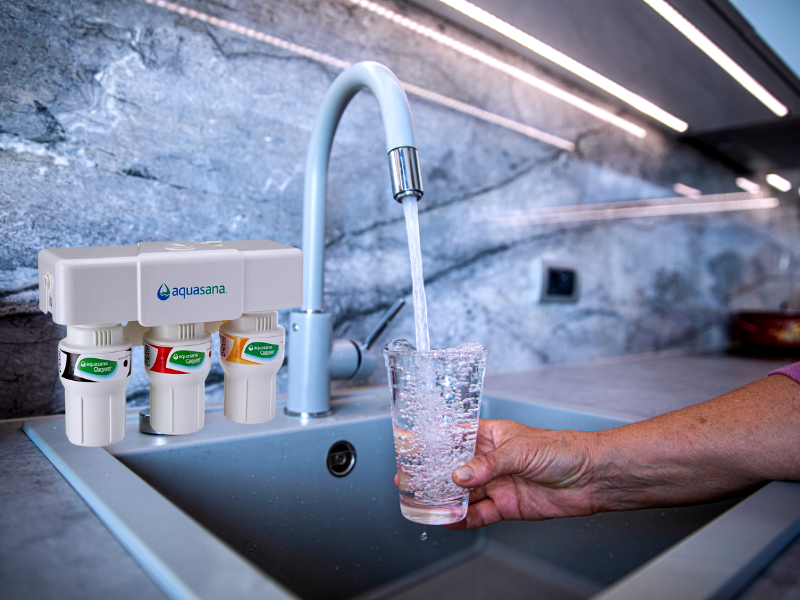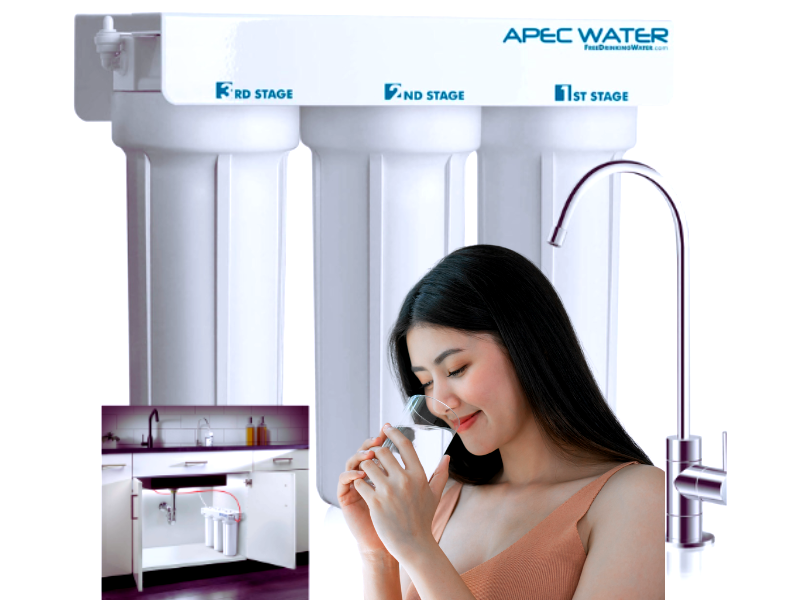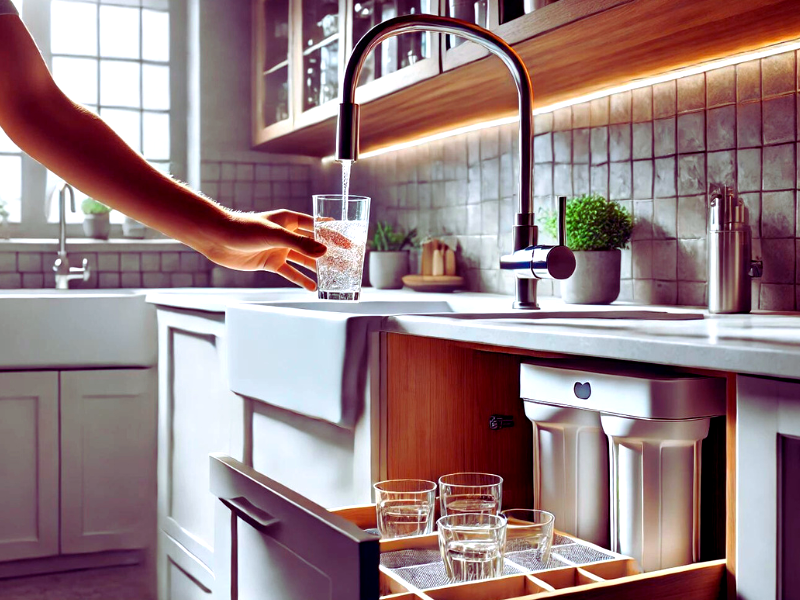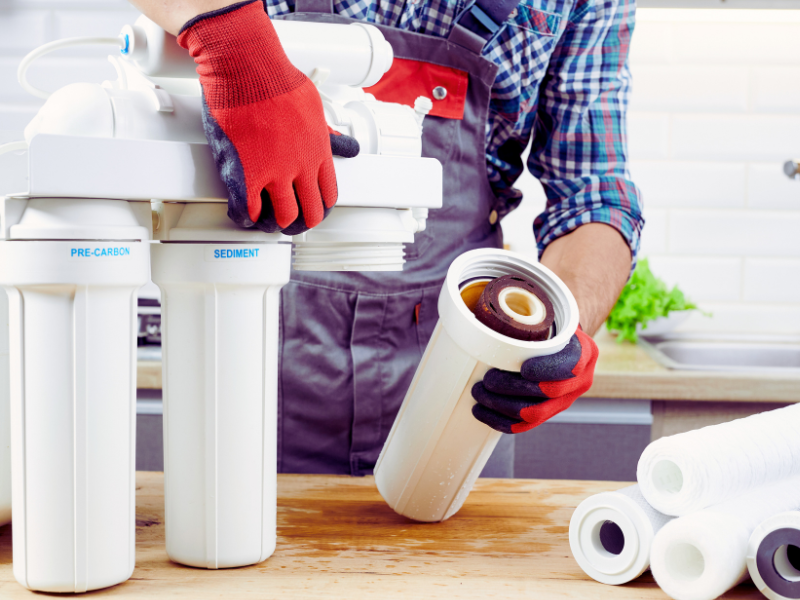Key Takeaways:
- Filter Lifespan: Under-sink filters typically last 6 to 12 months, depending on usage and water quality.
- Maintenance: Regular maintenance and timely filter replacements are crucial for optimal performance.
- Water Quality: The quality of your tap water significantly impacts the lifespan of your under-sink water filters.
Under-sink water filters are a popular choice for many households seeking to improve their drinking water quality. These filters are installed beneath the sink and designed to remove contaminants from tap water, providing cleaner, better-tasting water. But how long do under-sink filters last? This article delves into the lifespan of these filters, factors affecting their longevity, and tips for maintaining them.
Understanding Under Sink Water Filters

Water filters are installed directly under the kitchen sink and are connected to the cold water line. They filter water before it reaches the faucet, ensuring that the water you drink and cook is free from harmful contaminants. These sink water filtration systems can vary in complexity, from simple carbon filters to more advanced reverse osmosis systems.
The primary function of under-sink water filters is to remove impurities such as chlorine, heavy metals, and other contaminants from tap water. This not only improves the taste and odor of the water but also makes it safer for consumption. The type of filter used in the system plays a significant role in determining its effectiveness and lifespan.
Types of Under-Sink Water Filters
There are several types of under-sink water filters, each with its own set of advantages and limitations. The most common types include carbon, reverse osmosis, and activated carbon filters. Each type has a different filtration process and lifespan.
Carbon filters are widely used to remove chlorine, sediment, and volatile organic compounds (VOCs) from water. They are relatively inexpensive and easy to replace. Reverse osmosis filters, on the other hand, are more advanced and can remove a broader range of contaminants, including heavy metals and dissolved solids. However, they tend to be more expensive and require more maintenance.
Lifespan of Under Sink Water Filters
The lifespan of an under-sink filter can vary significantly based on several factors, including the type of filter, water quality, and usage. On average, most under-sink filters last between 6 to 12 months. However, some filters may need to be replaced more frequently, especially if the water quality is poor or the household has high water usage.
Carbon filters typically have a shorter lifespan, usually around 6 months, while reverse osmosis filters can last up to 12 months or longer. It’s essential to follow the manufacturer’s recommendations for filter replacement to ensure optimal performance and water quality.
Factors Affecting Filter Lifespan

Several factors can impact the lifespan of under-sink water filters. One of the most significant factors is the quality of the tap water. Water with high levels of contaminants will cause the filters to wear out more quickly. The amount of water used in the household can also affect the filter’s lifespan. Households with higher water usage will need to replace their filters more frequently.
Another factor to consider is the type of filter used. Carbon filters generally have a shorter lifespan compared to reverse osmosis filters. Regular maintenance and timely filter replacements are crucial to ensure the longevity and effectiveness of the water filtration system.
Signs That Your Filter Needs Replacement
It's essential to recognize the signs that your under-sink water filter needs to be replaced. One of the most common indicators is a noticeable water taste or odor change. If the water starts to taste or smell different, it may be time to replace the filter. Another sign is a decreased water pressure, indicating that the filter is clogged and needs to be changed.
Additionally, the filter is no longer effective if you notice any visible sediment or particles in the water. Regularly checking the filter and following the manufacturer's replacement schedule can help prevent these issues and ensure your water remains clean and safe.
Importance of Regular Maintenance
Regular maintenance is crucial for the longevity and effectiveness of under-sink water filters. This includes timely filter replacements, cleaning the filter housing, and checking for leaks or damage. Following the manufacturer's maintenance guidelines can help ensure the filtration system operates efficiently and provides clean drinking water.
Neglecting regular maintenance can lead to reduced filter performance, decreased water quality, and potential damage to the filtration system. It's essential to stay on top of maintenance tasks to avoid these issues and ensure that your under-sink water filter continues to provide optimal performance.
Cost of Filter Replacements
The cost of replacing under-sink water filters can vary depending on the type and brand. Carbon filters are generally more affordable, with replacement costs ranging from $20 to $50. Reverse osmosis filters, on the other hand, can be more expensive, with replacement costs ranging from $50 to $200 or more.
While the initial cost of filter replacements may seem high, it's important to consider the long-term benefits of having clean, safe drinking water. Investing in high-quality filters and regular maintenance can help save money in the long run by reducing the need for bottled water and preventing potential health issues caused by contaminated water.
Benefits of Under-Sink Water Filters

Sink water filtration systems offer several benefits, including improved water quality, better taste, and convenience. These systems can effectively remove a wide range of contaminants, including chlorine, heavy metals, and volatile organic compounds (VOCs), making the water safer for consumption.
Additionally, sink water filtration systems are convenient and easy to use. Once installed, they provide a continuous supply of filtered water directly from the faucet, eliminating the need for pitcher filters or faucet-mounted filters. This can save time and effort, making it easier to access clean, safe drinking water.
Comparing Under Sink Filters to Other Filtration Systems
When comparing under-sink water filters to other water filtration systems, such as pitcher filters or whole-house systems, it’s essential to consider the specific needs and preferences of your household. Under-sink filters are ideal for households that want a dedicated filtration system for drinking and cooking water.
Pitcher filters are more portable and can be used anywhere, but they require frequent refilling and have a limited capacity. Whole house systems, on the other hand,
Installation and Setup
Installing an under-sink water filter is a relatively straightforward process that can be done by most homeowners. The installation typically involves connecting the filter to the cold water line and mounting it under the sink. Most under-sink filters come with detailed instructions and all the necessary hardware for installation.
However, if you're not comfortable with DIY projects, it's always a good idea to hire a professional plumber to ensure that the installation is done correctly. Proper installation is crucial for the filter's performance and longevity, so it's essential to follow the manufacturer's guidelines and recommendations.
Environmental Impact
Using under-sink water filters can be eco-friendly by reducing the use of bottled water. Bottled water production and disposal contribute to plastic waste and environmental pollution. A filtration system can reduce plastic waste and minimize your carbon footprint.
Also, under-sink water filters can help save water by providing a continuous supply of filtered water from the faucet. This can reduce single-use plastic bottles and promote sustainable water habits.
Health Benefits

One of the benefits of using under-sink water filters is improved water quality which has health benefits. These filters can remove harmful contaminants like chlorine, heavy metals, and volatile organic compounds (VOCs) making the water safe to drink.
Filtered water can also improve its taste and odor making it more enjoyable to drink. This can increase water consumption which is essential for good health and hydration. Also, some filters can retain healthy minerals in the water adding to the health benefits.
Common Contaminants Removed by Under Sink Filters
Under-sink water filters are designed to remove many contaminants from tap water. The common contaminants are chlorine, lead, mercury, and volatile organic compounds (VOCs). These contaminants can affect the water's taste, odor, and safety.
Chlorine is used in municipal water treatment to disinfect water, but it can leave an unpleasant taste and odor. Lead and mercury are heavy metals that can harm health, especially for children and pregnant women. VOCs are organic chemicals that can cause various health issues, like respiratory problems and cancer. Under-sink filters can remove these contaminants and provide clean and safe drinking water.
Reverse Osmosis Systems
Reverse osmosis (RO) systems are a type of under-sink filter that uses a semi-permeable membrane to remove contaminants from water. These systems are very effective in removing many impurities, including heavy metals, dissolved solids, and volatile organic compounds (VOCs).
RO systems have multiple stages of filtration, including pre-filter, RO membrane, and post-filter. The pre-filter removes larger particles and sediment, the RO membrane removes dissolved solids and contaminants, and the post-filter polishes the water, making it clean and safe to drink. While RO systems are more expensive and require more maintenance, they offer better filtration performance.
Activated Carbon Filters
Activated carbon filters are another type of under-sink water filter. These filters use activated carbon to adsorb contaminants from water and remove chlorine, sediment, and volatile organic compounds (VOCs). Activated carbon filters are relatively affordable and easy to replace making them a popular choice for many homes.
The filtration process involves water passing through activated carbon, which traps and removes impurities. This improves the taste and odor of the water and makes it safe to drink. While activated carbon filters may not be as effective as reverse osmosis systems in removing dissolved solids and heavy metals, they are a cost-effective solution for improving water quality.
Filter Replacement Schedule

Following a filter replacement schedule is important to maintaining the performance and effectiveness of under-sink water filters. Most manufacturers provide guidelines on how often the filters should be replaced, usually every 6 to 12 months. You should follow these recommendations to get optimal water quality.
Replacing filters regularly can prevent clogging and reduce the risk of contaminants passing through the filtration system. Also, keeping track of the replacement schedule can help you plan and budget for filter replacements so you always have clean and safe drinking water.
DIY vs. Professional Installation
When it comes to installing under-sink water filters, homeowners have the option to install them themselves or hire a professional plumber. DIY installation can be a cost-effective solution especially if you have some basic plumbing skills. Most under-sink filters come with instructions and all the necessary hardware for installation.
But if you’re not comfortable with DIY projects or if the installation requires complex plumbing work it’s always best to hire a professional. A professional plumber can ensure that the installation is done right prevent potential problems and ensure the filter’s performance and lifespan.
Troubleshooting Common Issues
Like any other household appliance, under-sink water filters can sometimes have issues. Common problems are leaks, reduced water pressure, and changes in water taste or odor. You should address these problems as soon as possible to ensure the filter’s performance and water quality.
If you notice any leaks, check the connections and fittings to make sure they are tight and secure. Reduced water pressure means the filter is clogged and may need to be replaced. Changes in water taste or odor mean the filter needs to be replaced. Regular maintenance and timely filter replacements can prevent these problems, and your under-sink water filter will continue to provide clean and safe drinking water.
Comparing Costs of Different Filtration Systems
When comparing the cost of different filtration systems, you should consider the initial cost and maintenance costs. Under-sink water filters are generally more affordable than whole-house systems, with lower initial costs and replacement filters. Pitcher filters and faucet-mounted filters are the most affordable but require frequent replacement and have limited capacity. Whole-house systems provide filtered water to the whole house but can be more expensive and complex to install. Under-sink filters balance cost, convenience, and effectiveness, making them a popular choice for many homes.
Enhancing Water Quality with Under-Sink Filters

Under-sink water filters can improve tap water quality and provide cleaner and better-tasting water for drinking and cooking. These filters can remove a wide range of contaminants, including chlorine, heavy metals, and volatile organic compounds (VOCs), making the water safe to drink.
Also, under-sink filters can improve the taste and odor of the water, making it more enjoyable to drink. This can encourage more water consumption, which is important for good health and hydration. By investing in a good quality under-sink water filter, you can have clean and safe drinking water right from your tap.
Summary
Under-sink water filters are a great solution for households who want to improve their drinking water quality. These filters are installed under the sink and can remove a wide range of contaminants and provide cleaner and better-tasting water. The lifespan of under-sink filters varies depending on the type of filter, water quality, and usage, but most filters last between 6 to 12 months. Regular maintenance and timely filter replacements are key to optimal performance and water quality. By investing in a good quality under-sink water filter and following the manufacturer’s maintenance guide, you can have clean and safe drinking water right from your tap. Stay connected with us by subscribing to our newsletter today!
FAQ
How often should I replace my under-sink water filter?
Most under-sink water filters need to be replaced every 6 to 12 months, depending on the type of filter, water quality, and usage. To ensure optimal performance and water quality, follow the manufacturer’s recommendation for filter replacement.
Can I install an under-sink water filter myself?
Yes, many under-sink water filters come with instructions and all the hardware you need for DIY installation. But if you’re not comfortable with DIY or if the installation requires complex plumbing work, it’s better to hire a professional plumber.
What are the benefits of using an under-sink water filter?
Under-sink water filters have several advantages, including better water quality, taste, and convenience. These filters can remove a wide range of contaminants making the water safe to drink. It also provides a continuous supply of filtered water directly from the faucet with no need for pitcher filters or faucet-mounted filters.








